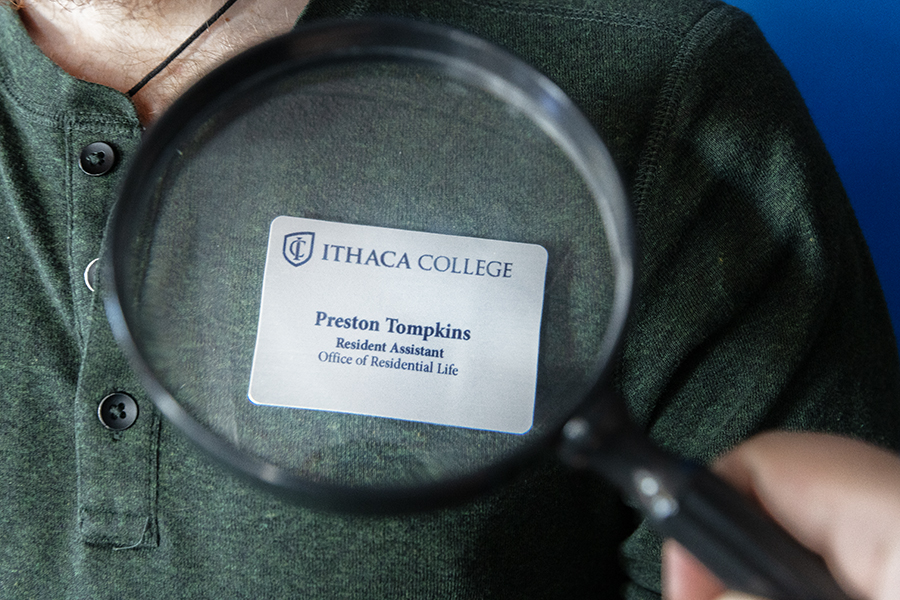In July, Ithaca College expanded the scope of its background check policy for its employees. Background checks will now be initiated for all benefits-eligible employees, as well as in January 2025 for some student employees who might have access to sensitive data or financial assets.
Kirra Franzese, associate vice president and chief human resources officer, said some examples of student employees who will be subject to these checks include resident assistants and anyone who has designated responsibilities, like holding a master key to important locations on campus. Franzese said background checks involve looking at information like criminal records or sex offense registries.
“We’re just ensuring that we’ve done all of our due diligence to ensure the safety and security of … students, as well as people that are working on campus, but also … all the data that we have on campus, as well as the financial resources that we maintain utilizing that data,” Franzese said.
Some examples of sensitive data include race and gender identifiers, Social Security numbers, grades, budgets and finances. Background checks are also executed to ensure the safety of students. Franzese said the checks are carried out by HireRight, a third-party background screening vendor in higher education. Franzese said the college has worked with HireRight for at least 10 years.
Franzese said that until July, the college had only been conducting background checks for very specific roles, like those within the Office of Residential Life, the Office of Information Technology and Analytics and the Office of Public Safety and Emergency Services.
“The scope previously … was somewhat limited to individuals who had special roles at the institution,” Franzese said. “[Now], you don’t necessarily have to have one of those responsibilities … to have a background check that’s completed.”
Franzese said the policy for student roles has not been implemented yet because the college is working on identifying which roles will be subject to a check. Once these roles are identified, background checks will be initiated for student roles in January 2025.
“We don’t want to do background checks if it’s unnecessary,” Franzese said.
Franzese said the Office of Human Resources is working with supervisors of student employees to identify student employee roles that will be subject to these checks.
According to the policy, the background check will be initiated when a prospective employee is offered a job, an employee is promoted or transferred into a role that requires screening and when roles that were not previously subject to background checks are identified in the policy update.
Senior Preston Tompkins is an RA and said he believes background checks are important.
RAs at the college have not had to go through a formal background check process. To apply, they submit a resume, answer some open-ended questions and are required to list two references. Students are then interviewed by professional ResLife staff and another RA.
However, Tompkins said he feels split on the college’s decision to expand its background check policy to other employees. He said the background checks might make the application process seem exclusive.
“I’m not sure if I would like that, just because I always liked having an RA that kind of resembled myself,” Tompkins said. “I like to know that people have flaws because it makes me relate to them more. Because if I see someone who seems to be completely flawless — they’ve had a completely clean history, nothing has ever happened to them, nor have they ever done anything — it might also make me trust them less for some reason.”
Tompkins said criminal records might not always be the best judge of the character for a potential employee.
“They could be judging an entirely different you at that point, which would be my biggest concern,” Tompkins said. “They might not even be looking at [the] current you. You could have changed so much. … I mean, if it’s something serious like Title IX type cases, homicide, sexual assault, that sort of thing, that should be looked into and investigated. … But if it’s minor — [like] trespassing, petty theft — I don’t know if that’s really a good judge of someone’s entire current self.”
Franzese said that if a prospective employee has a positive criminal background that comes up in the check, the college will work with them depending on the nature of the offense. Franzese said, for example, that the college could place them in a position where they can perform duties that are not connected to their previous criminal record.
“The intent is also not to … discriminate,” Franzese said. “We certainly don’t want bad things to happen here. But also, we understand people can be rehabilitated. We understand that we want to be an employer where we can also support someone who has had some remediations and can continue to do work and good work.”
Franzese said the college instituted a formal background check policy for select roles approximately 15 years ago and hiring managers were always expected to execute reference checks and validate credentials.
Tim Downs, vice president for finance and administration and chief financial officer, is the chair of the audit committee that looks over risk controls and assessments. Downs said background checks are an assessment of risk and that the college updated its policy to match industry standards.
Elon University in North Carolina, Emerson College in Boston and Gettysburg College in Pennsylvania are some comparable institutions to Ithaca College. At Elon, all faculty and staff are required to undergo a formal background check process and at Emerson, employees who work with minors or have unsupervised access to dorms are subject to background checks. Gettysburg carries out background checks on all new employees in addition to volunteers and interns who they deem to have significant interaction with students. Both Emerson and Gettysburg do not specify if student employees are included in the scope of their background check policy.
Downs emphasized the importance of communication between the employee and the college during the background check process. The policy states that prospective employees who do not agree to have a background check initiated will not be considered for the role.
Downs said that if a concerning incident comes up in a background check, it is reviewed by HR and the college’s legal counsel. Downs said this means the prospective employee’s direct supervisor might not be informed of an employee’s background — unless required upon review, depending on the nature of the offense — and thus aims to eliminate hesitation on the employee’s end.
“We encourage conversation between the potential or prospective employee and the manager to say, ‘Hey, if there are issues, please let us know,’ and we can certainly talk about them,” Downs said.















